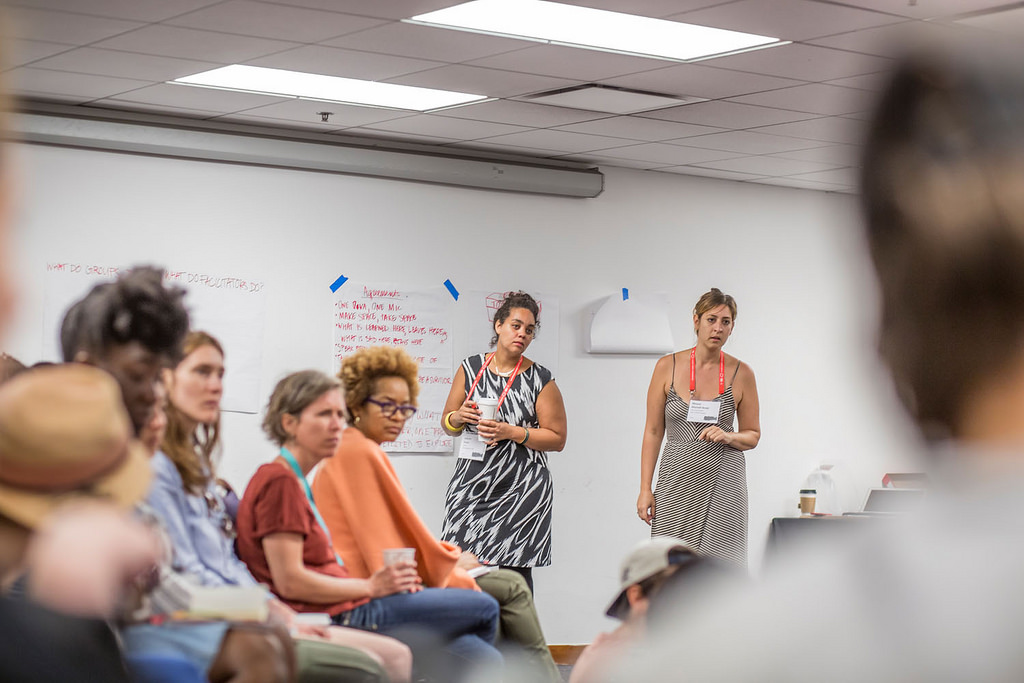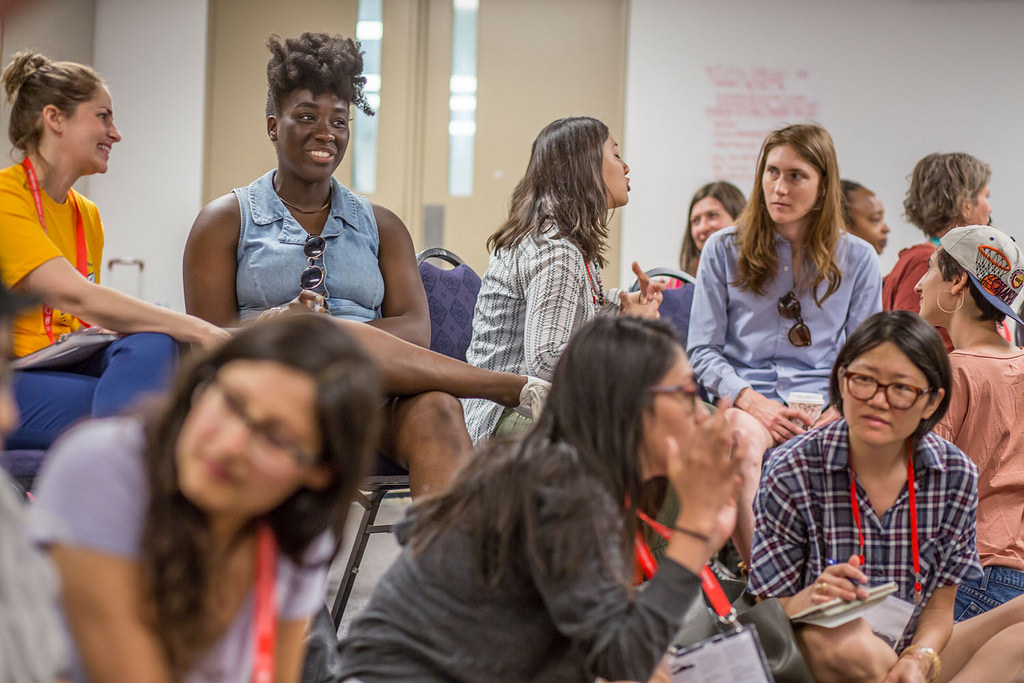The Allied Media Conference is a space to come together to explore the practice of “media-based organizing,” which is any collaborative process that uses media, art, or technology to address the roots of problems and advances holistic solutions towards a more just and creative world.
As we gear up for AMC2017, we are excited to take a look back at some highlights of last year’s conference. We hope the ideas and creative strategies explored in the interview below encourage you to propose a session for AMC2017!
Last year, one of your favorite sessions was “Holding Space: Strategies for Anti-oppressive Facilitation”, a workshop that explored strategies for facilitation that center the needs of Black, Brown and Indigenous people, disabled people, LGBTQ folks, survivors and others. Read our interview with facilitators Autumn Brown of Aorta, and Maryse Mitchell-Brody of The Icarus Project, and get inspired to submit a session idea of your own for AMC 2017!

How did you get involved with the AMC?
Autumn: I first attended the AMC in 2009, and facilitated a meetup called “Alternative Economies of Care” for people doing healing related work. I wanted to create a space with other people who were trying to ensure equitable access to healthcare outside of a profit-based system. At the AMC in 2011, I was invited to coordinate a track on healing justice, along with a couple of other health and healing justice organizers, and out of that crew came this idea of a “healing justice practice space,” which returns to the AMC every year.
Maryse: I came to the AMC because of Autumn, who told me “this conference is unlike any other you’ve been to, and it’s how every conference should be”. Meaning that it’s geographically in Detroit, and centered around people who are marginalized in social justice struggles and broader social change work. I was a presenter, and then a coordinator for the healing justice practice space. I’ve been really honored to be a part of that community and to expand what healing justice means. AMC2016 was the first year I attended with the Icarus Project, and I was able to bring some of the insight from the AMC into the facilitation work that we do, which is definitely grounded by healing.
How did the idea for this session come about?
Maryse: Through coming to the AMC since 2011, I have had the chance to talk with other social workers and social service providers about the need to provide concrete skills around the facilitation of conflict and trauma within our movements. Sometimes even facilitators want insights on how to make workshops more emotionally accessible, by becoming aware of microaggressions, or offensive comments, that can activate trauma for participants. Autumn and I had the profound blessing over the last decade to collaborate with other facilitators, trainers and national coalitions, so I asked her last year if she would be down for an anti-oppression facilitation training. Based on the popularity of that session in 2015 – 125 people, standing room only – we decided to make this into a two-part series for AMC2016.
One thing that informed the work was the need for concrete tools and strategies to hold space without harming each other in the face of collective trauma.
Autumn: I think that some really important context to add is that these workshops happened in the wake of significant community trauma following the massacres in Orlando this year, and Charleston the year before. So one thing that informed the work was the need for concrete tools and strategies to hold space without harming each other in the face of collective trauma. We’ve approached healing as treating everyone in our space as though they are a survivor of violence.
Why was it important to present this content at the AMC?
Autumn: AMC brings together frontline organizers who are working on the most crucial issues of our times, but who are also experiencing systemic harms inflicted on them by their comrades: silencing, bullying, cooptation of ideas. Even within our most radical movement spaces, there is a significant resistance to naming harm in real time. This is because we never learned another way of being, or we suppressed other ways of being in order to survive.
When we were initially organizing at the AMC, one of the taglines we would use was “medicine in media”, which meant that how we heal ourselves and each other is a form of media. The same is true of facilitation. Do we want to be doing mediations and facilitations that reinforce the colonizations of our bodies, or ones that liberate us? The AMC was important to reach with that critical approach to facilitation.
Maryse: To riff off of that, we haven’t been socialized into knowing what liberatory process looks like, so we’re co-creating that together all of the time. How do we hold space for building that process? How do we generate ideas to help us bring our disabilities and traumas and allow those to be held in ways that don’t harm the broader group or the work that group is trying to do? We’ve always been socialized in capitalism, racism, homophobia, etc., and we bring those into our spaces – we don’t exist outside of them. We want to have a process that allows us to dream of new ways of being.

What were some highlights of the session?
Autumn: The session went really beautifully, and we were very lucky that we had opportunities to model what we were teaching. There was one point where I made a joke that was in poor taste, and one of the participants who was Trans felt that it was a transphobic statement, and called me in. It was this amazing moment, because we had just been talking about vulnerability versus fragility in meeting spaces, and being vulnerable in conflict without being so fragile that you fall apart when someone is critical. It was an opportunity for me as a facilitator to receive feedback without freaking out about it, and apologize. For me, that was a personal highlight – that I had grown enough as a person to receive feedback and integrate it, instead of feeling it was a personal attack. And I think it was a great teaching moment about accountability.
Maryse: I think it’s a credit to the intentionality of the AMC that what could have been a painful experience was a growth edge instead. For me, a highlight was that I have been working with Autumn for so long – we met when we were in our early 20s living in Brooklyn, and we don’t get to come together much – and it was remarkable to work together and hold space with someone who has known me for a long time.
Autumn: I want to add that there was something about the sheer number of people who showed up with a real thirst for learning this skillset. There’s this idea that facilitation is a specialized skillset, and a lot of folks think that it has nothing to do with them. So it was affirming to see the democratization of the skillset because you may not always have enough money to hire a facilitator. The ideal is that we have more folks within our movements trained in facilitation who we can call upon when we need it.
Maryse: It was also cool to see how many radical social workers there were in the room! Most facilitation is thought of in the context of meetings, as opposed to support groups, etc., so that cross-pollination was amazing. It was great to see people drawing on different disciplines and approaches. At one point, somebody proposed thinking of meeting guidelines as a covenant – I hadn’t heard of that before, but I thought it was beautiful. That brought me to thinking about social change work as sacred work, and how we can create ritual and healing in social movement spaces.
What were some takeaways from the session?
Autumn: In terms of physical takeaways, we printed out a facilitation zine developed by Aorta, my worker co-op, that was developed a few years ago. It’s a really great go-to resource. For the second workshop we had a handout on “circle process”, developed by Danielle from the Rock Dove Collective.
Maryse: One of the things that we wanted people to come away with was an understanding about the difference between process and content: facilitators pay attention to the process, so the group can focus on content.
When people can witness effective co-facilitation, it can be a game changer. They are able to witness the way we work together, and the way we transparently let folks know what we were doing as we were doing it.
Autumn: To build upon that: facilitators are often taught that they should pay attention to process so that the group can pay attention to content; however, within a transformative approach, we understand that the process IS the content.
How the group is working together has an enormous impact on what work the group is able to do.
Maryse: We also gave the small groups opportunities to think through strategies and tools to confront harm. We came away with a toolkit for folks to use in different facilitation scenarios, and strategies to address those situations. In the second workshop we built on that, and talked about best and worst practices for facilitations. Part of that was Autumn and I talking about our own worst facilitation moments, and modeling humility.
Autumn: The major tool that stands out the most is the power of co-facilitation. When people can witness effective co-facilitation, it can be a game changer. They are able to witness the way we work together, and the way we transparently let folks know what we were doing as we were doing it.
What’s next? How will this work continue post-AMC?
Autumn: A couple of things have already come out of the session. We’re currently developing a webinar on anti-oppression communication for the Icarus Project that will be available to all of their members, and we’re really drawing on the AMC session for that. Given the popularity of the sessions, we’re wondering whether it would make sense to expand upon this work at future AMCs and potentially propose a whole track on facilitation as a skillset. We know tons of amazing facilitators who could do specialized workshops on particular facilitation skillsets.
Maryse: We would love a facilitation level-up, where experienced facilitators could do a workshop with each other. I also just get excited about continuing to work with Autumn! In terms of the Icarus Project, it feels important to me to blend these two worlds – as a psychotherapist and facilitator, and as a white person struggling against white supremacy – and continue to ask questions: how can we help people who are struggling show up for each other in organizing? How can we inject social justice movements with an understanding of what healing justice looks like in practice?
Want more AMC session inspiration? Read our interview with the presenters of “Babel’s Workshop: Best Practices for Multilingual Events”.
It’s that time of year again! We’re coming up on the 19th annual Allied Media Conference, June 15 – 18 in Detroit, and we need your ideas to make this year’s conference the best yet. Artists, designers, technologists, policy advocates, media enthusiasts: we encourage you to submit a session proposal! The deadline to submit your idea is March 12, 2017.